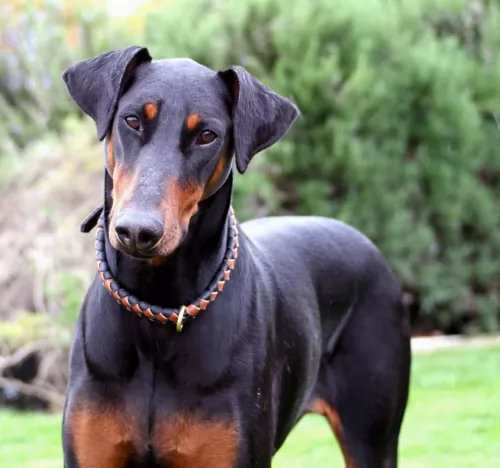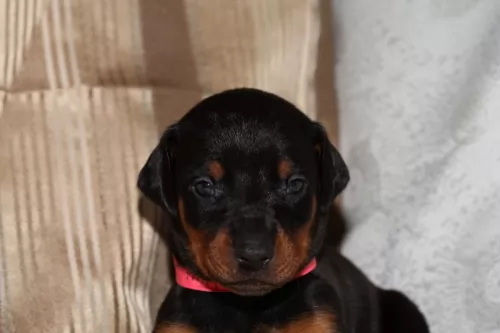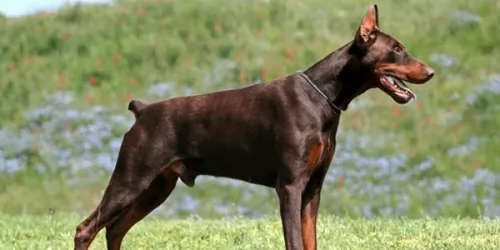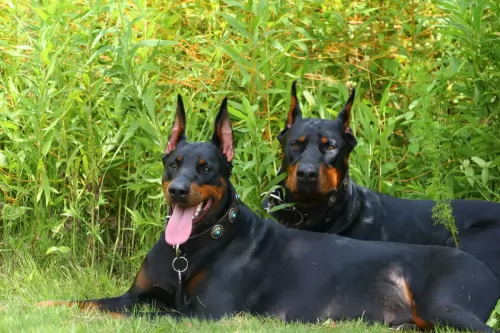 Petzlover
Petzlover Doberman Pinscher is originated from Germany but St. John's Water Dog is originated from Canada. Doberman Pinscher may grow 19 cm / 8 inches higher than St. John's Water Dog. Both Doberman Pinscher and St. John's Water Dog are having almost same weight. Both Doberman Pinscher and St. John's Water Dog has almost same life span. Doberman Pinscher may have more litter size than St. John's Water Dog. Both Doberman Pinscher and St. John's Water Dog requires Low Maintenance.
Doberman Pinscher is originated from Germany but St. John's Water Dog is originated from Canada. Doberman Pinscher may grow 19 cm / 8 inches higher than St. John's Water Dog. Both Doberman Pinscher and St. John's Water Dog are having almost same weight. Both Doberman Pinscher and St. John's Water Dog has almost same life span. Doberman Pinscher may have more litter size than St. John's Water Dog. Both Doberman Pinscher and St. John's Water Dog requires Low Maintenance.
 The origin of Doberman is Apolda, in Germany in 1890. It was officially recognized as a breed in 1900. The name originally called as Thuringer pinscher or Plizeilichi and the peer was renamed as DOBERMAN PINSCHER in 1899.American Kennel Club recognized DOBERMAN PINSCHER in 1908. The German tax collector called Karl friedrich developed Doberman.
The origin of Doberman is Apolda, in Germany in 1890. It was officially recognized as a breed in 1900. The name originally called as Thuringer pinscher or Plizeilichi and the peer was renamed as DOBERMAN PINSCHER in 1899.American Kennel Club recognized DOBERMAN PINSCHER in 1908. The German tax collector called Karl friedrich developed Doberman.
He developed a breed that would be able to protect him from his surroundings and from his neighborhoods. This Dober also ran as a local animal shelter and approch many dogs for his breeding program. But karl did not kept any proper records or document for this breeds origin. Dobeis are also found through United States, Russia and South Africa.
 The breed known as the St. John’s water dog is an extinct landrace breed. They were domestic dogs found in Newfoundland and at times were called the lesser Newfoundland. There is not much information available about the other breeds that went into its development. Hypothetically it is believed they are a mix of the Irish, Old English and Portuguese dogs bred to work.
The breed known as the St. John’s water dog is an extinct landrace breed. They were domestic dogs found in Newfoundland and at times were called the lesser Newfoundland. There is not much information available about the other breeds that went into its development. Hypothetically it is believed they are a mix of the Irish, Old English and Portuguese dogs bred to work.
It is also thought that other breeds in their family tree, descending from them, include the Golden Retriever, the Flat-Coated Retriever, the Chesapeake Bay Retriever, the Labrador and the Curly-Coated Retriever. The Newfoundland is also related to the St. Johns Water Dog through the line of Rafeirio do Alenteios that Portuguese fisherman brought to the island.
The breed was exported to England in the 19th century and early 20th. There the breeds of retrievers were developed. In Canada during this time frame restrictions were placed on dog ownership in order to encourage people to raise sheep. At the same time England imposed a long quarantine on all animals coming into the country in order to get rid of rabies. These two factors contributed greatly to the extinction of the breed. It seems the last two dogs were seen in a remote area in the 1980’s. All attempts to save the breed failed.
 Dobermans are certainly shorthaired mixed –breed shepherd dogs, this kind of dogs are chosen only for their intelligent, sound and endure. This breed is best in attitude and appearance, and now it is found in world wide. Dobermans are highly intelligent and fast runners. So mostly dobers are only suited for Police, Army and Guard works. Dobies are also used as guide dogs for the blind.
Dobermans are certainly shorthaired mixed –breed shepherd dogs, this kind of dogs are chosen only for their intelligent, sound and endure. This breed is best in attitude and appearance, and now it is found in world wide. Dobermans are highly intelligent and fast runners. So mostly dobers are only suited for Police, Army and Guard works. Dobies are also used as guide dogs for the blind.
They are very elegant in appearance. Dobies are watchful, determined, energetic, fearless, obedient, alert and loyal. Dobies are short coat so it is easy for care. Brushing regularly can avoid shedding at home. They have almond shaped eyes, they have long narrow heads. The Doberman ears are often cropped but many of the owners like dobers by their nature. Dobers looking was always like a graceful giant.
 St. John’s Water Dog is strong, medium sized and stocky. They looked more like English Labs than American Labs. They had a thick, short coat, loved swimming, had a lot of endurance and rudder tail. It was also described as a thin, black dog with short hair. They had white patches on their chest and feet. His nose was thin and tapered, his legs powerful, his chest muscular. The breed is quick, swims, runs quickly and is a fighter as well.
St. John’s Water Dog is strong, medium sized and stocky. They looked more like English Labs than American Labs. They had a thick, short coat, loved swimming, had a lot of endurance and rudder tail. It was also described as a thin, black dog with short hair. They had white patches on their chest and feet. His nose was thin and tapered, his legs powerful, his chest muscular. The breed is quick, swims, runs quickly and is a fighter as well.
Never accepted by any major kennel club except as a foundation breed. They became extinct.
 Dobermans are individual in personalities. Some dogs are friendly and outgoing; some Dobies are reserved and shy. Some will be more dominant with other dogs it used to chase small dogs and cats. Most of the dobers are soft in character and love companionship with people.
Dobermans are individual in personalities. Some dogs are friendly and outgoing; some Dobies are reserved and shy. Some will be more dominant with other dogs it used to chase small dogs and cats. Most of the dobers are soft in character and love companionship with people.
Dobers have high energy level and it requires a lot of exercise in order to avoid harmful behavior to others. We should keep them interested because intelligent dogs are easily got bored. They mostly enjoys only in outing because they will be happy with the people who walks, runs and in bike riding.
When learning new things they are the best. Dobermans are not able to be a lazy. For many years dobers are the only dogs being excellent as police dogs. Because they are highly active in nature so they are interested in new this for learning.
Dobers are apartment adaptable dogs. They used to bark but are close and friendly to people. At the same time we have to train dobers to welcome the guest also.
 There is no documented history of any genetic or hereditary illnesses in the breed. However, it seems rational to believe they suffered from ailments similar to Labradors and newfoundland though they are smaller dogs.
There is no documented history of any genetic or hereditary illnesses in the breed. However, it seems rational to believe they suffered from ailments similar to Labradors and newfoundland though they are smaller dogs.
 Dobers are mostly come in black, blue, red or fawn. Dobers are low maintenance for grooming. They were clean dogs because they never make a strong dog odor. Using brush in dobers hair for once per week reduces hair fall control. Dobers are not requiring frequent bathing most of the owners are getting bath for 3 or 4 times per year in grooming.
Dobers are mostly come in black, blue, red or fawn. Dobers are low maintenance for grooming. They were clean dogs because they never make a strong dog odor. Using brush in dobers hair for once per week reduces hair fall control. Dobers are not requiring frequent bathing most of the owners are getting bath for 3 or 4 times per year in grooming.
You can feed your puppy 2-3 small meals per day until it was 4 months old. And then have to decrease one meal and two for a day. And often you should not keep food and leave food sitting out all the time. Then after six months needs to stop feeding much vitamins and minerals because it leads a several health problems in his muscle and joints.
This type of dogs should not be tied up alone outside, because it should be manifest itself by barking chewing. The people who are working for a long time should not be adopting this type of dogs. Naturally dobers are well protective to our home and people. At the same time small children must be supervised. At the same time if we are not strict, dobers would be get out of our hand.
 1Feeding the puppy – Don’t overfeed – they have a propensity toward obesity. Feed high quality, high protein 3 x a day.
1Feeding the puppy – Don’t overfeed – they have a propensity toward obesity. Feed high quality, high protein 3 x a day.
2.Feeding the adult – Don’t overfeed. Feed a high quality, high protein 1-2 x a day.
4. Games and Exercises – They need space to run and they love to explore. They would also love to be near water where they could swim. Good at dock diving, field trials, flyball and frisbee.